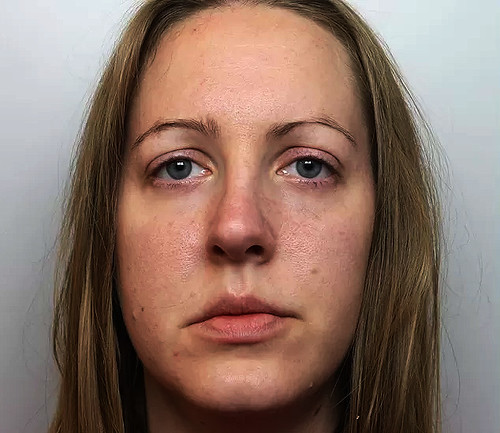Calling For A Lucy Letby Documentary Already Is Grossly Inappropriate
Lucy Letby #LucyLetby

As calls for a Lucy Letby Documentary grow, Georgia Aspinall unpicks why this immediate reaction feels extremely uncomfortable.
It’s the most harrowing serial killer case Britain has seen since Harold Shipman was jailed for life in January 2000 for murdering 15 patients while working in Hyde, Greater Manchester. Lucy Letby, now one of Britain’s most notorious murderers, was sentenced to a whole life order today after her conviction for the murder of seven babies.
The case has, unsurprisingly, captured the attention of the entire world, a morbid fascination proving as strong as ever. But said fascination has an ugly undertone, with calls already being made for production companies like Netflix to make a documentary about Lucy Letby’s crimes. Right now, ‘Lucy Letby documentary’ is a breakout search term on Google, and earlier this week a fake mock-up of an ITV documentary – featuring Sheridan Smith as Lucy Letby – went viral.
There is, in fact, already a documentary about Lucy Letby on BBC, as well as a YouTube series dedicated to her case, and a podcast that promises to ‘brings listeners behind the headlines of the trial of Lucy Letby.’ The fascination with her case has already resulted content creation then, but that hasn’t stopped people demanding Netflix get involved and produce even more around the case.
Of course, documentaries serve a powerful purpose in exposing the darker truths of otherwise unheard cases. Some have been instrumental in reigniting interest in forgotten injustices, even resulting in cases being reopened and convictions being served, or wrongful convictions overturned. They can be extraordinarily educational, but there’s also a darker side to our obsession with true-crime documentaries in particular – and the desire for Lucy Letby documentaries and content across social media proves that.
So often, when a suspicious murder grips the internet, the case is immediately interrogated by true-crime obsessives. Hard line opinions are formed, fingers are pointed, sometimes with little to no evidence. When it plays out in real time, like we saw during the search for Nicola Bulley, it can have an untold impact on not just the relatives on the victim, but the police investigation itself. Suddenly, empathy turns to obsession, and the victim – and their associates – lives are treated like live sources of entertainment.
In the case of Lucy Letby, a conviction had already been served when true crime fans started demanding a documentary, and yet it still somehow feels like a gross reaction. This is the story of seven families who lost their children, more who nearly did, at the hands of Lucy Letby – families who haven’t even had the chance to look Lucy in the eye at her sentencing while they deliver their final statements to the court. Families who are grieving heavily after years of this case consuming their lives. Surely, before anything else, we should be thinking of them and what they would want before demanding their lives be turned into TV shows.
Frankly, whether or not a documentary about Lucy Letby is ever made – and we don’t doubt it’s crossed the mind of many producers today – now is not the time to be calling for any kind of TV series about her. Let the families of Lucy Letby’s victims grieve, their pain is not a performance for public fascination.